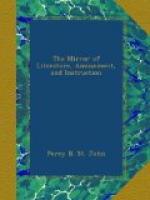who had nothing to lose, and might have something
to win; and he fixed upon Thurlow. Thurlow read
over his brief with the highest glee, and had an interview
with the prisoner. As he entered the court, he
jogged another briefless one like himself, and said,
in his favourite slang language—“Neck
or nothing, my boy, to-day! I’ll soar or
tumble!” The opening speech of the eminent counsel
for the Duke, and the evidence, completely convicted
the woman. The articles stolen were brought into
court. When Thurlow rose to cross-examine the
leading witness, before he asked a question, he merely,
bending his black brows upon the man, turned round,
and desired to look at the things that were said to
be stolen. They were before him all the time,
and were then presented to him; and, without a word,
he carelessly tossed them again upon the table before
him. He now closely questioned the witness, as
to points of honour and honesty; then, in a minute
or two, again asked to see the things. He was
informed that he had already had them handed to him,
and that they were now before him. “I mean,”
said he, with well-assumed ignorance, “the things
that this unhappy woman is accused of having stolen.”
The witness, with great sufficiency and knowledge,
as if to prove his own correctness, pointed them out
upon the table before him. “And what else?”
said he. He was answered that they were the whole.
“And you, Mr. Witness,” said he, with a
sneer, “are the man of great trust, of accredited
honour and honesty; and, full of your own consequence,
and in high feather, you come here to follow up a
prosecution against a fellow-servant, and a confidential
one (you tell me), whom you have indicted as a felon,
for taking these rags,” exhibiting some cloth
that happened to be torn; “and this is the sum
and substance of her offence! And all these witnesses,”
pointing to a group, who had pushed themselves forward,
“have been brought into this honourable court,
to affix the ownership of the high and mighty noble
Duke and Duchess to these cast-off, worn-out clothes!
And here comes this fine gentleman to swear to the
robber of that,” holding up the garment, “which
he himself would not accept as a gift! Shame,
say I; and I am certain every one of your hearts,
Gentlemen of the Jury, reechoes my indignant feeling!
Shame, say I, on everyone of the party,” pausing
to give one of his looks to each individual, “that
is concerned in such a business! Why, it is more
like a conspiracy against this poor destitute woman,
against whom I lament to see my very honourable and
learned brethren,” pointing to the other counsel,
“here arrayed—it is more like a conspiracy
(not that my learned friends have lot, or part, or
feeling in the business)—more like a conspiracy
against this woman, than any, the least act of felony
on her part. These clothes! I pray you look
at them, Gentlemen of the Jury—these clothes!!
Can you conceive, Gentlemen, that if you were a Duke
and Duchess of N——, you would have




